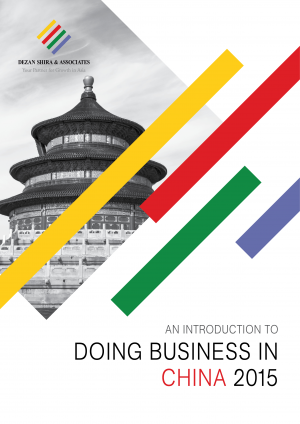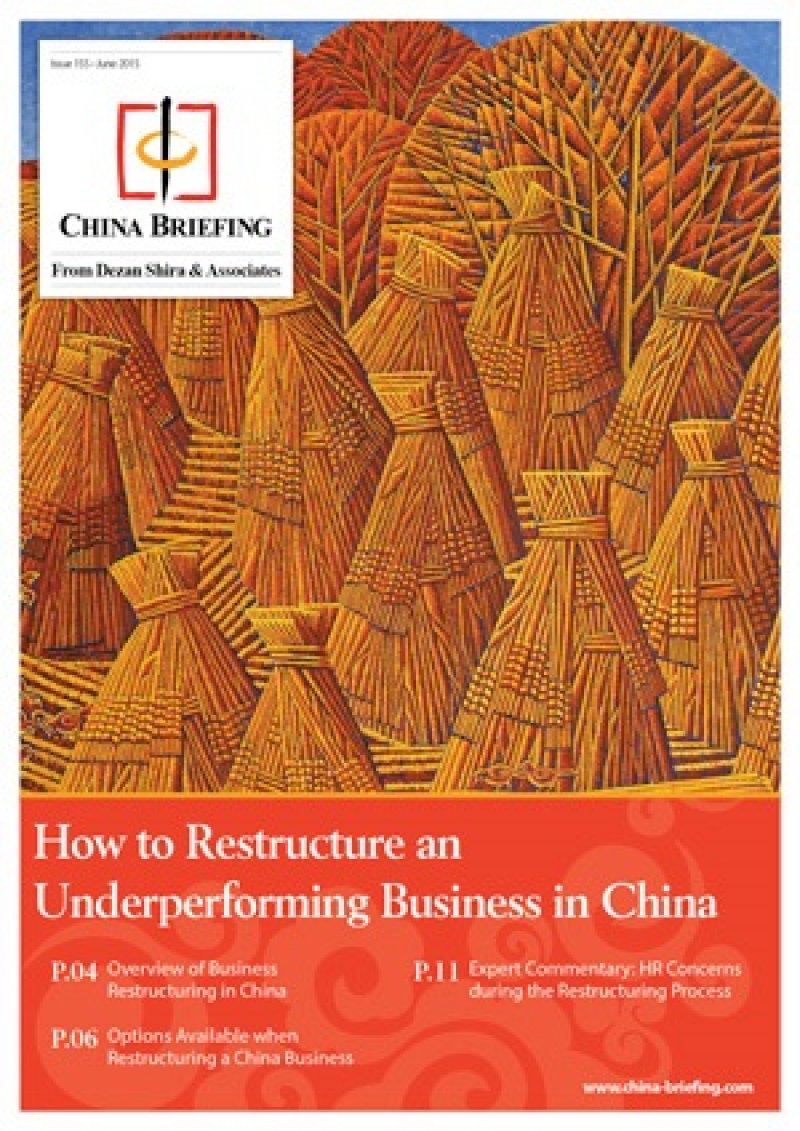Strategic Considerations when Establishing a WFOE in China, Part 1: Business Scope and Registered Capital
By Chet Scheltema and Vivian Mao
Dezan Shira & Associates, Shanghai
China’s consumer market continues to grow rapidly and the appetite for global brands and western technology is as strong as ever. Establishing a formal business presence in China presents tremendous opportunity, but, at the same time, risks are abundant and the operating environment tricky. Its regulatory environment, for instance, although not complex by international standards, is perilous to navigate. Decisions once made can prove difficult and costly to unwind and may expose a business to undesirable consequences. Therefore, it is important to think deliberately and act strategically in consultation with experienced and knowledgeable China practitioners.
In the first of this multi-part series that examines key strategic considerations when establishing a formal presence in China, we discuss corporate business scope, funding and registered capital.
Corporate Business Scope
Whereas “anything lawfully permitted” might serve as an acceptable corporate charter or scope of permitted activity for an American business entity upon formation, this is not the case in China. The specific business activities of a wholly foreign owned enterprise (WFOE) must be carefully and precisely set forth in its application for registration and then submitted for review to Chinese authorities at the Ministry of Commerce (MOFCOM), and then the Administration of Industry and Commerce (AIC). Every word will be closely scrutinized by authorities to determine if the proposed business activity is officially restricted and/or infringes upon informal barriers or otherwise displeases the reviewing authority. A negotiation will then occur where the resulting business scope will likely not be what was originally proposed or envisioned, so a good agent that communicates frequently and clearly with your team and services as an effective advocate on your behalf is essential.
Another important reason to devote attention to negotiating a desirable business scope is that once it is approved and finalized, it will then be very difficult and time-consuming to alter. The initial application to the MOFCOM for incorporation (and negotiation of the proposed business scope) and the subsequent registration with the AIC would need to be repeated, as would a month or more of post-licensing formalities, including tax registration where the business scope is used to determine the WFOE’s applicable tax rates.
![]() RELATED: Business Advisory Services from Dezan Shira & Associates
RELATED: Business Advisory Services from Dezan Shira & Associates
Although it’s not common for Chinese authorities to censure an organization for periodically stepping outside the bounds of its officially authorized business activities to engage in auxiliary activities, the ability to issue tax invoices to its partners for the specific services rendered is very important. These clients or customers will normally insist upon a specific invoice based on a certain value-added tax (VAT) rate for use as a tax offset or deduction, and it would not be unusual for them to refuse to make payment for services rendered if the appropriate invoice cannot be issued. Therefore, because a VAT invoice cannot be issued at the relevant tax rate for activities not specified in the business scope, it is critically important to negotiate approval of a sufficiently broad and relevant business scope with careful consideration from the beginning of one’s anticipated scope of business activities and client’s and customer’s required invoicing.
Funding and Registered Capital
Although China has moved to eliminate the requirement of a minimum capital injection (aka, “Registered Capital”) as a condition for incorporating a WFOE, the reality remains that each application for incorporation will be reviewed on a case-by-case basis and Chinese authorities at MOFCOM will typically require a minimum commitment of between RMB 200k to RMB 500k for a basic consulting WFOE (A manufacturing WFOE would normally be required to inject considerably more Registered Capital). They will review a “feasibility study report” submitted as part of the incorporation application (a projection of expected expenses and profits for the first three years of the WFOE’s life) and use it as a rough guide to set the minimum Registered Capital. Once injected, the Registered Capital monies will remain available to fund the activities of the WFOE until it achieves self-sustainability – or the Registered Capital would need to be increased.
There is no such thing in China as a shell holding company. All WFOEs are expected to achieve sustainability, and, if they do not, then they may be subject to undesirable scrutiny by Chinese tax and regulatory officials.
For these reasons, it is important to plan the funding and sustainability of the WFOE from the moment of incorporation until profitability and to set its Registered Capital accordingly. Investors need to strike a balance between infusing the WFOE with sufficient capital to fund its initial growth but not with so much that the capital sits idle and does not earn a return, trapped in the foreign currency account of the WFOE. Investors from foreign jurisdictions might speculate the funds could merely be returned to the foreign shareholders if not needed, but reversing and returning Registered Capital from China should be regarded as effectively impossible from a practical point of view. Therefore, investors should thoughtfully consider how much Registered Capital would be needed to achieve sustainability.
For those investors that do not anticipate achieving profitability and expect on-going operational costs for those investors whose WFOE unexpectedly fails to achieve its objectives, recourses may be given to alternative funding mechanisms. Of course, one option is to increase the official Registered Capital of the WFOE and inject additional capital. This is a tax-free transaction, and therefore highly efficient from a tax point of view. However, the challenge presented is that such a method would require that the business license be amended to reflect the increased Registered Capital, then the monies injected. This is a time-consuming and slow process, as it would require investors to resubmit their business plan and “feasibility study” to MOFCOM for approval. The business license itself would need to be reissued and a number of formal governmental registrations updated, and the WFOE may have consumed all remaining cash.
![]() RELATED: Changing the Registered Capital of a Company in China
RELATED: Changing the Registered Capital of a Company in China
Consequently, another funding mechanism often resorted to is a related-party transaction between the parent shareholder and WFOE, whereby “consulting services” are provided to the parent under the terms of the consulting agreement in return for payments that fund the WFOE’s operations. Because this is a “current account” transaction, it can be completed rapidly despite China’s foreign exchange and capital account restrictions. The downside is that it is a taxable transaction subject to VAT of at least six percent – the VAT rate for “modern services” such as consulting – and will also be subject to corporation income tax. The transactional fees and VAT and corporate income tax would need to be anticipated and budgeted were a WFOE to be funded with this alternative funding mechanism. Despite the “dodgy” sounding nature of the transaction, it is a common means for WFOEs to receive funding if investors do not wish to repeatedly increase the Registered Capital. Many such WFOEs were originally intended to be cost centers that would not generate adequate revenue, if any, to be self-sustainable.
Since China effectively disallows the establishment of foreign not-for-profit organizations, many of those that choose to conduct operations in China establish themselves as WFOEs (for-profit enterprises) and often resort to such a funding mechanism to maintain sufficient cash flow for operations.
In the next article of this series, we discuss WFOE holding companies, WFOE corporate names and a WFOE’s registered address.
|
Asia Briefing Ltd. is a subsidiary of Dezan Shira & Associates. Dezan Shira is a specialist foreign direct investment practice, providing corporate establishment, business advisory, tax advisory and compliance, accounting, payroll, due diligence and financial review services to multinationals investing in China, Hong Kong, India, Vietnam, Singapore and the rest of ASEAN. For further information, please email china@dezshira.com or visit www.dezshira.com. Stay up to date with the latest business and investment trends in Asia by subscribing to our complimentary update service featuring news, commentary and regulatory insight. |
![]()
 An Introduction to Doing Business in China 2015
An Introduction to Doing Business in China 2015
Doing Business in China 2015 is designed to introduce the fundamentals of investing in China. Compiled by the professionals at Dezan Shira & Associates, this comprehensive guide is ideal not only for businesses looking to enter the Chinese market, but also for companies that already have a presence here and want to keep up-to-date with the most recent and relevant policy changes.
How to Restructure an Underperforming Business in China
In this issue of China Briefing magazine, we explore the options that are available to foreign firms looking to restructure or close their operations in China. We begin with an overview of what restructuring an unprofitable business in China might entail, and then take an in-depth look at the way in which a foreign company can go about the restructuring process. Finally, we highlight some of the key HR concerns associated with restructuring a China business.
 Adapting Your China WFOE to Service China’s Consumers
Adapting Your China WFOE to Service China’s Consumers
In this issue of China Briefing Magazine, we look at the challenges posed to manufacturers amidst China’s rising labor costs and stricter environmental regulations. Manufacturing WFOEs in China should adapt by expanding their business scope to include distribution and determine suitable supply chain solutions. In this regard, we will take a look at the opportunities in China’s domestic consumer market and forecast the sectors that are set to boom in the coming years.
- Previous Article China Regulatory Brief: Two-child Policy and China Advance Pricing Arrangement Annual Report
- Next Article China Regulatory Brief: Paternity Leave in Beijing, Import Tariffs on New Zealand Dairy Products










